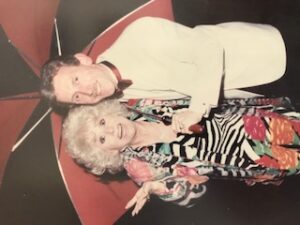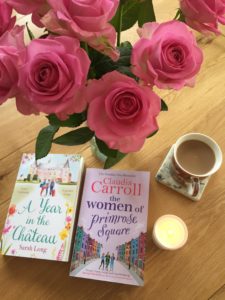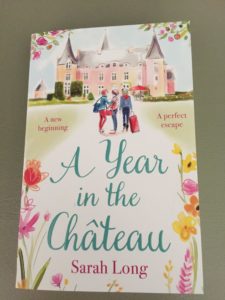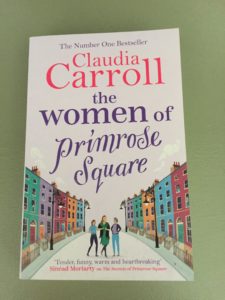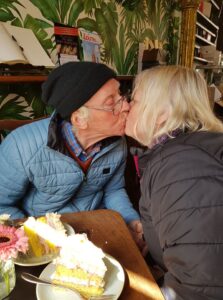
Tomorrow I am going to see Bob in the garden of his care home. He went into full time care 131 days ago – three days after lockdown was declared. From a full-time ‘on watch’ and caring role to the silence and loneliness of an empty house was unbearable. Worst of all, for most of the time I have only been able to wave to him from the road and look up to him at the first floor window. The ache in my heart was real and I asked my eldest son if I was ill.
My stomach lurched at the thought of relinquishing his care to strangers. They would never look after him like I do. The cajoling and the patience needed. I knew his ways! I wasn’t even sure I could manage to sleep on my own after having Bob’s hand in mine for so long. Even at night time he wanted the reassurance of holding hands. But I was so exhausted; I couldn’t do another day.
I knew it was getting close as I had been up every night but one for three weeks and the day times were not easy either. Bob was having night terrors; he was terrified and agitated, screaming that I was killing him or he was dying, or I was dying. He would get aggressive and squeeze my arms sometimes bruising me. Such a gentle man but his face in such anguish, it was very frightening. I managed to see our Dementia doctor and we doubled the Respiridon in the morning and the Tramazodone at night. Even that didn’t work, such was his fevered brain. My goodness, how strong must his anxiety be? He wouldn’t settle and I ended up getting up with him and the daily start to the morning routine settled him. It was often 5am or earlier.
When Bob went into the home I was still working – in school three days at first, then from home: preparing education health care plans, organising Annual Reviews, ringing parents and writing risk assessments for those front line workers’ children who could attend school. It was important work and I wanted to do a good job.
My primary concern was Bob but there were always other things to worry about, such is life. Our youngest got stuck in Australia on his year travelling. He eventually found a job with his London company in an office in Sydney for 2 years. Another hurdle overcome. Of course Bob would want him to take the opportunity and live his life. But packing up his boxes of clothes for the courier was a little sad.
I also felt constant concern for our son Joe who was working long shifts on the front line in infectious diseases dealing with the Covid 19 cases. It just seemed a constant worry.
At first Bob went into the care home on ‘Respite.’ It was the same place he went to on day care on Tuesdays when I was teaching or if I went for a little walking break. They told me a bed had become available on the Dementia wing. I thought it was what he already knew and would settle better there than a new care home. I knew some of the staff from when I picked him up. It was familiar for both of us. It cost £800 a week for Respite but three days later it had gone up by almost £50 a week. I was desperate and I thought we would get support from social services eventually as we were well below the £23,500 threshold.
During this time I was supported by two amazing women who had been with me on this journey: the dementia nurse who knew us well and the Admiral nurse, a specialist Alzheimer nurse.
Our boys were fully supportive and said I could have done no more. However my journey to get funding was a very different matter. Covid 19 did not help me as it was much slower to get help from the relevant services.
After a difficult fight for part funding for continuing healthcare from the NHS (which I won after doing a lot of research and reading their own legal documents) and after completing a favourable checklist with the Dementia nurse. I then endured a 3 hour panel meeting where I had to argue virtually every domain to get the rating that truly reflected Bob’s condition. It was challenging and difficult and a real endurance test (which I was determined to win for Bob) where the agenda was set at the start to minimise every aspect of his condition in order to make sure he didn’t get the funding for having oversight of nursing care – which he clearly needed. The newly appointed social worker agreed he was eligible and she supported us in the meeting.
How on earth do other exhausted carers fight for their loved ones like I did? Most people don’t have the stamina.

I had made it my project. I went through 250 pages of Bob’s medical records and highlighted the evidence for the 12 domains, his care home notes for the last week before the meeting (I’d asked for them all), his consultant letters, my diary, the hospital discharge letters etc. I studied the law and I knew what was likely to happen. It is notoriously difficult to get this funding but I knew Bob would meet the severe criteria for several domains that were irrefutable – cognition, mobility and possibly behaviour and psychological /emotional well being.
Why did I bother?
Because it was the right thing to do and Bob deserved the right care. He had worked hard all his life and never asked for anything – now he was at his most vulnerable.
I sent off all the intrusive evidence to Serco: our bank statements, Bob’s pension statements, copies of our house deeds, our bills, outgoings. It was exhausting. But we then got some part funding from adult social care and this was then backdated to 14 th May but paid directly to the care home.
It was now July and I had paid the Respite costs of almost £850 each week up to the end of June. I was bleeding money. The care home needed a further £248 a week third party top up as the contract of ‘respite’ had changed to ‘long term care’ from 14 th May. I couldn’t afford it and so decided to move Bob to another home.
I have visited twice a week since this began, sometimes a lot more and now we are able to meet in the beautiful grounds of the home. Bob’s health has declined. He cannot understand why I was not inside with him holding his hand in the days during lockdown. He scratched the glass or tried to put his fingers through the gap in the window to touch my fingertips. He kissed the pictures in the memory book I gave him and he repeated the children’s names over and over and called for them.
It is heart -breaking. He cannot walk or weight bear and is usually sat in a chair or in the wheelchair I bought for him. He doesn’t ask for the toilet anymore. His hair is long, no hairdressers allowed.
My darling Bob is a shell of what he once was but sometimes his face lights up when he remembers me and for those minutes it is worth it. My love for him is endless. I know somewhere deep inside him he remembers me. Sometimes he says ‘ she’s lovely’ or he tries to kiss me by mouthing kisses. I am filled with a strange mixture of terror and anticipation when I go to see him. My stomach rolls at what I might see and how he might be. All I know is I have to see him in order to settle myself. Then I try to get on with my life for the next few days until I am pulled back to him. My Bob.

